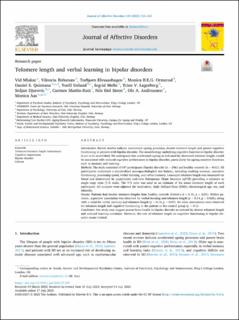Telomere length and verbal learning in bipolar disorders
Mlakar, Vid; Birkenæs, Viktoria; Elvsåshagen, Torbjørn; Ormerod, Monica Bettina E. Greenwood; Quintana, Daniel; Ueland, Torill; Melle, Ingrid; Lagerberg, Trine Vik; Djurovic, Srdjan; Martin-Ruiz, Carmen; Steen, Nils Eiel; Andreassen, Ole; Aas, Monica
Peer reviewed, Journal article
Published version
Permanent lenke
https://hdl.handle.net/11250/3101240Utgivelsesdato
2023Metadata
Vis full innførselSamlinger
- HV - Master i Atferdsvitenskap [275]
- Publikasjoner fra Cristin [3256]
Sammendrag
Introduction: Recent studies indicate accelerated ageing processes, shorter telomere length and poorer cognitive
functioning in patients with bipolar disorder. The neurobiology underlying cognitive function in bipolar disorder
is yet to be established. We anticipated that accelerated ageing as indicated by shortened telomere length, would
be associated with reduced cognitive performance in bipolar disorder, particularly for ageing sensitive functions
such as memory and learning.
Methods: The study consisted of 647 participants (bipolar disorder [n =246] and healthy controls [n =401]). All
participants underwent a standardized neuropsychological test battery, including working memory, executive
functioning, processing speed, verbal learning, and verbal memory. Leucocyte telomere length was measured via
blood and determined by quantitative real-time Polymerase Chain Reaction (qPCR) providing a telomere to
single copy ratio (T/S ratio). The T/S ratio was used as an estimate of the mean telomere length of each
participant. All analyses were adjusted for medication, Daily Defined Dose (DDD), chronological age, sex, and
ethnicity.
Results: Patients had shorter telomere lengths than healthy controls (Cohen’s d =0.11, p =0.01). Within patients’
, a positive association was observed for verbal learning and telomere length (β =0.14, p =0.025), along
with a trend for verbal memory and telomere length (β =0.11, p =0.07). No other associations were observed
for telomere length and cognitive functioning in the patient or the control group (p > 0.1).
Conclusion: Our study may suggest poorer brain health in bipolar disorder as indexed by shorter telomere length
and reduced learning correlates. However, the role of telomere length on cognitive functioning in bipolar disorder
seems limited.

